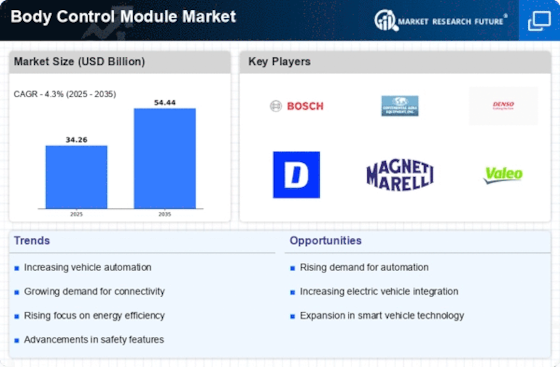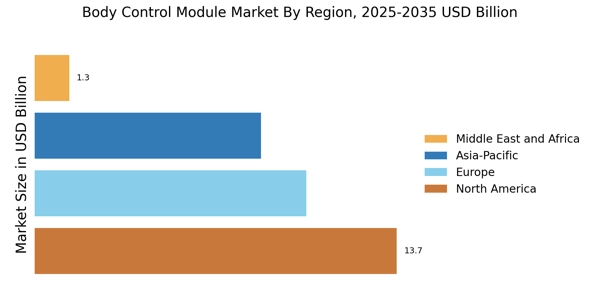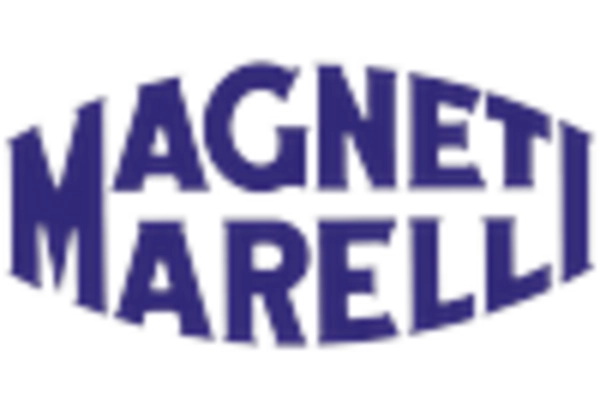Integration of Advanced Safety Features
The integration of advanced safety features in vehicles is significantly influencing the Body Control Module Market. As safety regulations become more stringent, manufacturers are compelled to incorporate systems such as automatic emergency braking, lane-keeping assist, and adaptive cruise control. These features rely heavily on body control modules to function effectively, as they coordinate various sensors and actuators throughout the vehicle. In 2025, the market for advanced driver-assistance systems (ADAS) is projected to reach a valuation of over 60 billion dollars, underscoring the critical role of body control modules in ensuring vehicle safety. This trend not only enhances consumer confidence but also propels the Body Control Module Market forward as automakers strive to meet evolving safety standards.
Rising Demand for Vehicle Electrification
The increasing trend towards vehicle electrification is a pivotal driver for the Body Control Module Market. As manufacturers pivot to electric vehicles, the need for sophisticated body control modules that manage various electronic systems becomes paramount. In 2025, it is estimated that the electric vehicle segment will account for approximately 30% of total vehicle sales, necessitating advanced body control modules to optimize performance and energy efficiency. These modules play a crucial role in managing battery systems, regenerative braking, and energy distribution, thereby enhancing the overall functionality of electric vehicles. Consequently, the Body Control Module Market is likely to experience substantial growth as automakers invest in innovative technologies to meet consumer demand for electric vehicles.
Growing Consumer Preference for Connectivity
The growing consumer preference for connectivity and smart features in vehicles is reshaping the Body Control Module Market. Modern consumers increasingly demand seamless integration of their devices with vehicle systems, leading to the incorporation of features such as smartphone connectivity, in-car Wi-Fi, and advanced infotainment systems. By 2025, it is anticipated that over 70% of new vehicles will be equipped with some form of connectivity, necessitating advanced body control modules that can manage these complex systems. This shift towards connected vehicles not only enhances the driving experience but also drives innovation within the Body Control Module Market, as manufacturers seek to develop modules that support a wide array of connectivity options.
Regulatory Compliance and Environmental Standards
Regulatory compliance and environmental standards are increasingly shaping the Body Control Module Market. Governments worldwide are implementing stringent emissions regulations and fuel efficiency standards, compelling manufacturers to adopt advanced technologies in their vehicles. Body control modules play a vital role in ensuring compliance by managing various systems that contribute to emissions reduction and fuel economy. By 2025, it is expected that regulations will become even more rigorous, pushing automakers to invest in innovative body control modules that enhance vehicle efficiency. This trend not only drives the demand for advanced body control modules but also positions the Body Control Module Market as a key player in the automotive sector's transition towards sustainability.
Technological Advancements in Automotive Electronics
Technological advancements in automotive electronics are a significant catalyst for the Body Control Module Market. Innovations such as the Internet of Things (IoT), artificial intelligence, and machine learning are being integrated into vehicle systems, enhancing the capabilities of body control modules. These advancements allow for improved data processing, real-time monitoring, and enhanced vehicle performance. In 2025, the automotive electronics market is projected to surpass 300 billion dollars, indicating a robust demand for sophisticated body control modules that can support these technologies. As vehicles become more intelligent and autonomous, the Body Control Module Market is poised for growth, driven by the need for advanced electronic solutions.

















